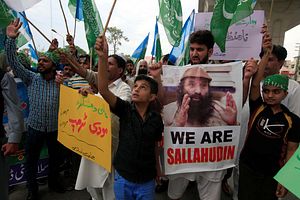In theory, there shouldn’t be anything particularly shocking about the U.S. State Department sanctioning Mohammed Yusuf Shah, alias Syed Salahuddin, as a “Specially Designated Global Terrorist.”
After all, Salahuddin loudly and proudly spearheads the United Jihad Council (UJC) umbrella, a conglomerate of 13 jihadist groups including Jaish-e-Muhammad (JeM), Lashkar-e-Taiba (LeT), and Salahuddin’s own Hizbul Mujahideen, based in Pakistan-administered Kashmir. JeM and LeT both are not only banned as terrorist organizations by the United States, but by Pakistan as well.
With its declared aim of Kashmir’s merger with Pakistan and establishment of Sharia in the state, Hizbul Mujahideen has taken responsibility for numerous attacks in Indian-administered Kashmir over the previous two decades, including last year’s Pathankot raid, which eventually brought India and Pakistan to the point of issuing nuclear threats by the end of 2016.
More so than the announcement against Salahuddin, it is the timing that is critical for Pakistan. The State Department’s notification came in the build up to Indian Prime Minister Narendra Modi’s meeting this week with U.S. President Donald Trump.
Last month, Trump not only earmarked India as a victim of terror – ironically at an “Islamic” summit in Riyadh – but he didn’t mention Pakistan as one, despite its ranking fourth in the Global Terrorism Index of most affected states.
What was implied by Trump in Riyadh has now become official U.S. state policy through the sanctions on Salahuddin: that separatist militancy in Indian-administered Kashmir is terrorism.
The Pakistani leadership has begun to vocally acknowledge the U.S. stance, with Federal Interior Minister Nisar Ali Khan accusing Washington of “speaking India’s language” on Kashmir following the verdict on Salahuddin.
The turnaround in American policies among the South Asian stakeholders of the Kashmir conflict can be gauged when one considers that sanctions on the UJC chief came ahead of the visit of Modi, who himself was once banned from entering the United States for his involvement in the Gujarat riots of 2002 as the then-chief minister of the state.
Of course, if we go a couple of decades further back, it was the United States that laid the foundation of its defeat of the Soviet empire on the Af-Pak front by encouraging Afghanistan- and Kashmir-bound jihadism.
The lesson here is that there are no perpetual policies or permanent allies. After the decades-long failure of its Kashmir policy, Pakistan will have to evolve as well, to safeguard its own interests and those of the Kashmiris fighting for autonomy.
As Pakistan followed through on the sanctions against Salahuddin with an equally resolute support for Kashmiri “freedom supporters,” the state has been scrambling for Plan B on Kashmir, when no such backup strategy has existed since Indo-Pak partition and the birth of the territorial dispute.
The civilian leadership’s intent to take decisive action against jihadists of all shapes and sizes blew up into a major civil-military scandal last year, which has brought the current government to the brink of a premature exit ahead of next year’s general elections.
Although the ruling Sharif family being embroiled in the Panama Papers corruption scandal means that its position has further weakened, the detention of LeT chief Hafiz Saeed, accused in the 2008 Mumbai attacks, in January this year suggests a counterterror change might be in the offing, even if it’s orchestrated from overseas.
But considering the Pakistani investment – both ideological and geopolitical – it’s hard to see Islamabad backpedaling on its Islamist support for Kashmir. This is especially true when there’s a more convenient – albeit short-term – alternative.
With Pakistan outsourcing its economic sustenance to China, through the much heralded economic corridor, which is a gateway to Chinese hegemony over the state, Islamabad would see no reason to worry about ties with the United States or India. This is true despite the ruling Sharif family’s envisioned economic liberalism in South Asia, eyeing cooperation with India.
Beijing has recently blocked moves to designate JeM chief Masood Azhar and LeT leader Zaki-ur-Rehman Lakhvi terrorists at the United Nations. In 2015 it stalled a similar move against Salahuddin as well.
Therefore, it’s evident that China wouldn’t mind the eastbound jihadist factory churning out militants in Kashmir, as long as there’s a guarantee that its economic investment would remain secure against Islamist violence.
But considering that the UJC subgroups have aligned themselves with the likes of Lashkar-e-Jhangvi – which orchestrated twin bombings in Parachinar on Friday – and al-Qaeda – with Masood Azhar criticizing the Pakistani government over the Osama bin Laden raid in local Urdu newspapers – how can Islamabad distinguish between these jihadist groups when they’ve long ceased to know the difference themselves?
Beijing certainly has no soft corner for Islamism, and has even accused Pakistan of breeding Uyghur jihadists responsible for the East Turkestan separatist militancy in Xinjiang. This means Islamabad will eventually have to cut ties with Kashmir-bound jihadist groups in the long run.
As things stand, Pakistan is only buying time for decisive action against the likes of Salahuddin, who till now has been openly addressing press conferences in Pakistan-administered Kashmir and attending rallies in the capital.
Till then, Pakistan should prepare itself for a militant backlash from these groups, who would look to follow through with Salahuddin’s threats – issued from within Pakistani territory – of attacking Islamabad should the ideological and material support for Kashmir jihad be withdrawn.

































